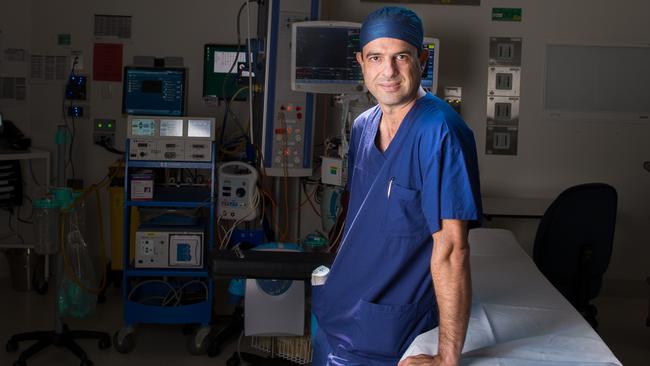Private hospitals face $250m blackhole under draft prostheses changes
The government is attempting to rein in spiralling prostheses costs but private hospitals say patients will be left footing the bill under a current proposal.

Private hospitals say they are facing a funding hole of at least $250m under proposed cuts to the prostheses list, which could lead to them withdrawing uneconomical surgery and closing hospitals, placing further pressure on the public system.
Health insurers, meanwhile, say Australians are paying among the highest prices in the world for prostheses such as replacement hips, knees and other artificial body parts, accusing medical device companies of ‘‘gaming’’ the system by adding ancillary items such as sponges and skin glues – blowing out the cost to about $2bn a year.
In the middle is the federal government attempting to broker a solution that will stamp out alleged price gouging, taking pressure off premiums, while ensuring hospitals continue to have access to the vital equipment they need.
The battle began in 2017 when Health Minister Greg Hunt announced cuts to the prostheses list, promising $250m in savings. Health insurers say only 10 per cent of these savings have materialised, accusing medical device companies of upselling ancillary items to offset the changes. The government has now proposed removing about 90 per cent of items on the general miscellaneous list to solve this problem. But hospitals say they will be left $250m worse off, with not-for-profit operators expected to be the hardest hit given they have limited capacity to absorb the extra costs.
James Kemp, the health policy director of Catholic Health Australia, which represents the biggest grouping of non-government hospital, aged and community health services, said the current proposal offered two outcomes: higher out-of-pocket costs or products no longer being used in certain surgeries. “Neither of these outcomes is in any way reasonable,” Mr Kemp said.
“Taking items off the Prostheses List without a robust option for fair reimbursement will deliver a blow to patient care and the health sector.
“If items are removed, amidst the ongoing uncertainty of a funding source and hospitals unable to simply absorb the $250m that these items cost each year, what else could it mean except out of pocket fees for patients or the products no longer being available for use.”
Mr Kemp said new reforms needed to ensure that health funds “continue to pay a fair price for these items”, stating “what is the point of health funds if not to pay for the treatment costs of their members?”.
“Hospitals have been hard hit by Covid, and like many organisations, are already absorbing extra costs due to Covid. We are fighting to ensure that doctors can continue to access any items on the prostheses list that they wish to use in delivering high quality care.”
Australian Medical Association president Omar Khorshid said the miscellaneous list needed to be reformed and agreed that some items should be removed and be funded via the block payments insurers make to hospitals.
But he rejected a review accounting firm Ernst & Young prepared for the government, which the current draft proposals were based on.
“We are committed to reform but not necessarily to the reform that’s been proposed by that EY report. There’s no way that the hospitals can just absorb $250m worth of cuts,” Dr Khorshid said
“Basically it’s still a work in progress and we would not agree with a suggestion that the GM (general miscellaneous) list be cut by 90 per cent, and that there’d be no compensation for hospitals. That’s a ridiculous suggestion that will lead inevitably to out-of-pocket cost for patients, because there’s no way the hospitals will absorb that kind of loss.
“And I think that’s an outcome the government will be very keen to avoid as well. We are engaged in ongoing discussions with the (health) department, and with all the members of the industry insurers, the hospitals, the device manufacturers and trying to find a way forward that’s reasonable.”
Australia’s second-biggest private hospital operator, Healthscope, said while it supported the need for reform, the current proposal could lead to hospitals cutting “unaffordable” surgery.
“While we support reform of the prostheses list, the proposed changes to the general miscellaneous category will simply shift cost and risk from insurers to others in the sector,” a Healthscope spokesman said. “As many of these costs are outside the control of the hospital, we are concerned they will result in higher out-of-pocket costs for patients, or decisions to stop undertaking certain surgical procedures as they are no longer affordable.”
The government is inviting submissions from the health industry on its proposals until September 17.
“The (Health) Department intends to convene a clinical advisory group to assist in analysing the comments received and finalising the items to be removed. A final list of items for removal will be announced in November 2021,” the government said.




To join the conversation, please log in. Don't have an account? Register
Join the conversation, you are commenting as Logout